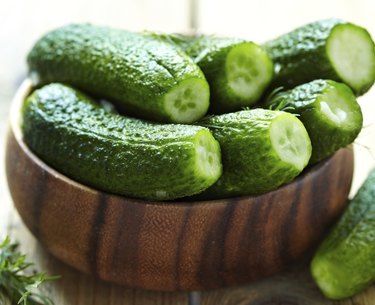
Dill pickles -- and other salty foods -- cause your blood pressure to increase through the natural action of sodium on the body. Eating one pickle won't kill you. Combined with the rest of the foods in your diet that contain added sodium chloride, however, a steady habit of pickle consumption can lead to high blood pressure and other serious chronic diseases. Consider whether the additional nutrition in cucumbers is worth the sodium trade-off when putting foods such as pickles on your daily menus.
How Sodium Affects Blood Pressure
Video of the Day
When your intestine absorbs sodium during digestion, the increase in sodium electrolytes causes fluid migration into the bloodstream to dilute it. More fluid applies greater force against the blood vessel walls, and blood pressure goes up. Your body maintains an electrolyte balance when your potassium intake exceeds your sodium intake. In this ratio, potassium acts to mellow sodium's activity. If you get more sodium than potassium, the sodium mechanism goes unchecked.
Video of the Day
Sodium in Food Processing
Most people do consume more sodium than potassium, in large part because sodium chloride, or table salt, is added to so many everyday foods. Bread, cheese, cereal, deli meats -- and dill pickles. Like dill pickles, ham, olives, herring and many other foods are salt-processed, a prevalent means of preserving foods before the era of refrigeration. Now these foods simply appeal to American tastes for salty food. Commercial preparers utilize ever larger amounts of salt to make their brands stand out. Amid public concerns about sodium intake, some manufacturers offer low-sodium versions of traditional higher-salt foods -- including pickles.
Pickle Nutrition
One regular medium dill pickle has 569 milligrams of sodium -- a significant portion of the recommended 2,300 milligram daily limit, set by the Institute of Medicine. Low-sodium dill pickles, in comparison, contain 12 milligrams of sodium. Sweet pickles have about 40 percent less sodium by weight, but have other health disadvantages, such as a high sugar content.
Health Significance
If the rest of your diet contains lopsided sodium-potassium nutrition, you put yourself at risk of high blood pressure. By the time you develop high blood pressure and diagnose it, your heart, blood vessels and kidneys may have sustained substantial damage. Over time, this high blood pressure contributes to cardiovascular disease, as well as other chronic diseases, such as kidney disease.
- Harvard School of Public Health: Lower Salt and Sodium
- U.S. Department of Agriculture: Dietary Guidelines for Americans 2010
- National Institutes of Health Research Matters: Sodium-Potassium Ratio Linked to Cardiovascular Disease Risk
- USDA National Nutrient Database: Pickles, Cucumber, Dill or Kosher Dill
- USDA National Nutrient Database: Pickles, Cucumber, Dill, Low-Sodium
- USDA National Nutrient Database: Pickles, Cucumber, Sweet (Includes Bread and Butter Pickles)
Is this an emergency? If you are experiencing serious medical symptoms, please see the National Library of Medicine’s list of signs you need emergency medical attention or call 911.